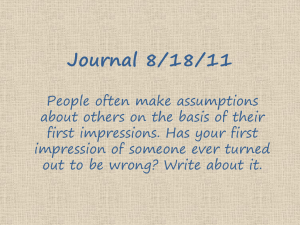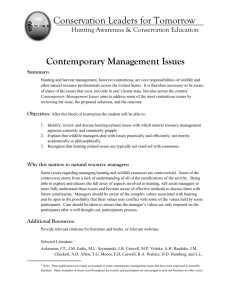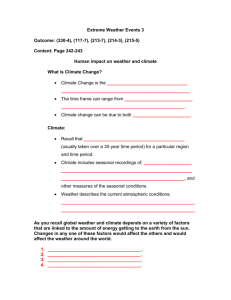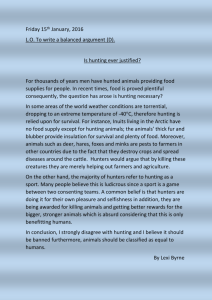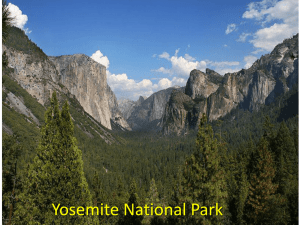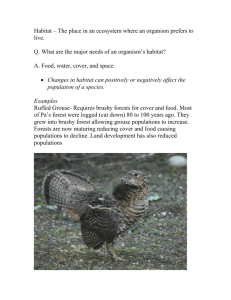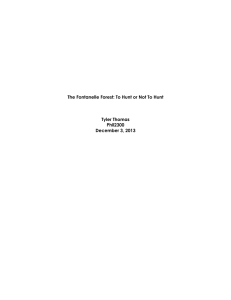Meagan Crockett Phil 2300 Position Paper Fontenelle Forest
advertisement
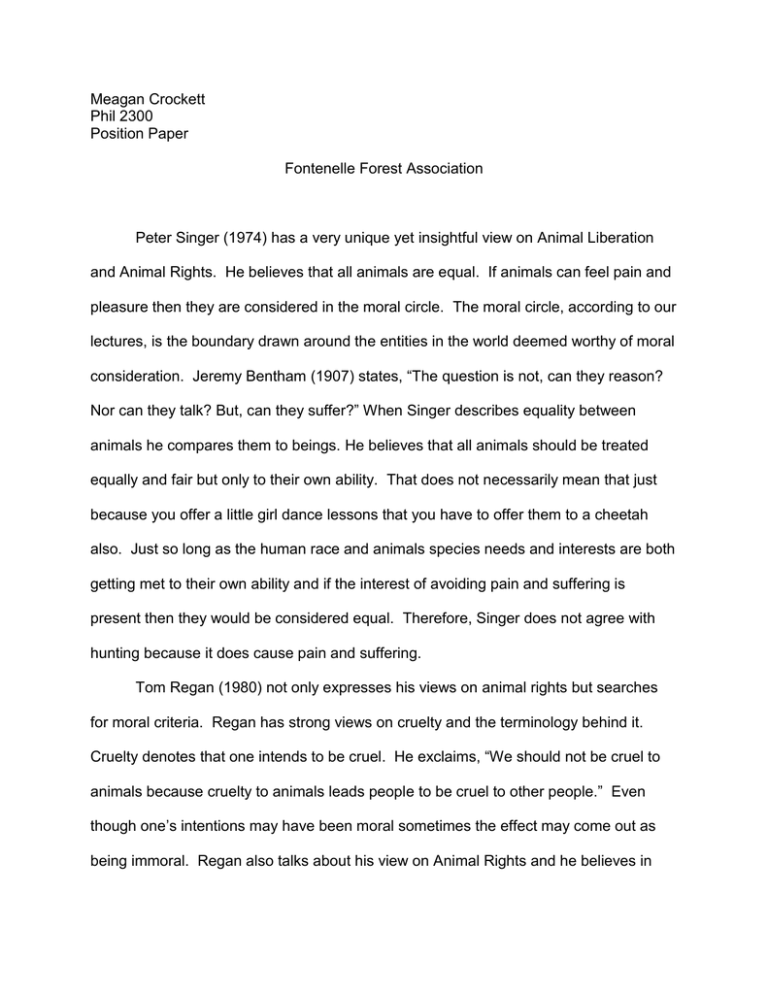
Meagan Crockett Phil 2300 Position Paper Fontenelle Forest Association Peter Singer (1974) has a very unique yet insightful view on Animal Liberation and Animal Rights. He believes that all animals are equal. If animals can feel pain and pleasure then they are considered in the moral circle. The moral circle, according to our lectures, is the boundary drawn around the entities in the world deemed worthy of moral consideration. Jeremy Bentham (1907) states, “The question is not, can they reason? Nor can they talk? But, can they suffer?” When Singer describes equality between animals he compares them to beings. He believes that all animals should be treated equally and fair but only to their own ability. That does not necessarily mean that just because you offer a little girl dance lessons that you have to offer them to a cheetah also. Just so long as the human race and animals species needs and interests are both getting met to their own ability and if the interest of avoiding pain and suffering is present then they would be considered equal. Therefore, Singer does not agree with hunting because it does cause pain and suffering. Tom Regan (1980) not only expresses his views on animal rights but searches for moral criteria. Regan has strong views on cruelty and the terminology behind it. Cruelty denotes that one intends to be cruel. He exclaims, “We should not be cruel to animals because cruelty to animals leads people to be cruel to other people.” Even though one’s intentions may have been moral sometimes the effect may come out as being immoral. Regan also talks about his view on Animal Rights and he believes in “rights” over “goods”. Whether the initial act may be moral or beneficial to a large number of people, but in turn, violates someone’s rights or dignity then without question it is immoral. In my mind I think Regan would have a tough time with hunting. Sometimes the initial act of hunting is not always for cruel reasons such as for sport; but maybe it is to feed a family or help with over population. In the end, whether it was for the right reasons, someone is always going to view it as immoral and in Regan’s mind, if it violates just one being then it is considered immoral. Aldo Leopold (1949) talks about the Land Ethic and the holistic ecological part of it. “The land ethic changes the role of Homo Sapiens from conqueror of the landcommunity to plain member and citizen of it.” The Land consists of soil, water, plants, and animals. Leopold designs a Biotic Pyramid, this pyramid consists of all animal and plant life and they are put into different stages or categories. The bottom of this pyramid consists of energy and soil and goes all the way to big meat eating animals. Leopold was the founder of the science of wildlife management. He does not believe in hunting but when managing wildlife sometimes hunting is required. Looking out for humans, species and the lands rights all at once to provide safety and equality within the wildlife. Gary Varner (2003) makes a very good theoretical conflict between Animal Rights/Welfare vs. Holistic Environmentalism. All animal rights go against hunting, sport, food and wilderness management. Hunting causes pain, suffering, and violates animal’s rights. On the Holistic side of things Leopold points out, “A thing is right when it tends to preserve the integrity, stability and beauty of the biotic community. It is wrong when it tends otherwise.” When making our environment a holistic environment then sometimes wilderness and ecosystem management is required due to overpopulation, invasive species and the loss of members of the upper Pyramid levels. Now that I have explained the ideas of hunting from various philosophers, I would like to talk about a story by Jared Diamond (1992) called, Must we shoot deer to save nature? This is about an all-natural forest called Fontenelle Forest. The idea of this forest was to preserve it in its natural state. The Fontenelle Forest Association runs this forest and they are a nonprofit organization. This association has created two rules f or the forest. Rule 1: For visitors; all plant and animal life is strictly protected. Rule 2: No fishing, hunting, or weapons. The idea behind these rules is that there will no be no management or interference by humans. In result of creating these rules for this forest a lot of negative has come of it, more than positive. A major issue with this “experiment” as I call it, is the abundance of species, which causes for plants, nuts and berries to diminish. After all the non-species food sources become low to non-existent the species begin to diminish also due to starvation. Some people looked at the philosophy of laissez-faire which means to let things be and everything will be fine and wanted the forest ran that way. After research it was shown that this does not work for nature reserves either. One example of that was at Kenya’s National Park where they refused to kill the elephants and let them overpopulate and eventually destroyed their own habitat. Another example of mismanagement in the Grand Canyon was when they decided to kill thousands of mountain lions, wolves, coyotes and bobcats to help protect the Rocky Mountain mule deer. As a result, the plan had been successful in saving the mule deer but short after the mule deer then began to overpopulate and overgraze the vegetation and die. Some people think that just because it seems like the right idea at that moment and that it saves species or wildlife right then that it is the right decision. After reading about and researching the Fontenelle Forest, I think it proves that nature cannot preserve itself and it needs management to survive and be prolonged. We cannot ignore our responsibility to help preserve wildness and wildlife because there are obvious heavy consequences. I really like the idea of having this forest as an experiment and example for everyone to learn from and teach us how to preserve our land. As for hunting, I have many mixed feelings about it and still have not exactly decided on my personal moral stance. I love animals and do not agree with them getting killed for sport. After learning about wilderness and wildlife management and the importance of it I have to agree with hunting as long as it is for management. I understand that overpopulation and big predators will always need to be managed for the safety of the environment and other species. I would not completely agree with one philosopher or another, but I do agree with preserving the beauty and stability of the community. As long as hunting is not done out of cruelty or for sport then I understand. Our environment is so important in keeping us alive and some people take that for granted. References Aldo Leopold, “The Land Ethic,” from A Sand County Almanac. (New York, Oxford University Press, 1949. p. 201-226. Gary Varner, “Can Animal Rights Activists Be Environmentalists?” Environmental Ethics: An Anthology. (Andrew Light and Holmes Rolston III, eds.). (Malden, MA: Blackwell Publishing, 2003), p. 97-99, 101-103, 104-106 Jared Diamond. 1992. Must we shoot deer to save nature? Natural History 101(8):2-6. Jeremy Bentham. An Introduction to the Principles of Morals and Legislation. 1907. Library of Economics and Liberty. Peter Singer, “All Animals Are Equal,” from Philosophic Exchange, Vol. 1, No. 5 (Summer 1974), 243-257. Tom Regan, “Animal Rights, Human Wrongs,” from Environmental Ethics, Vol 2, No 2. (Summer 1980), 99-120.
